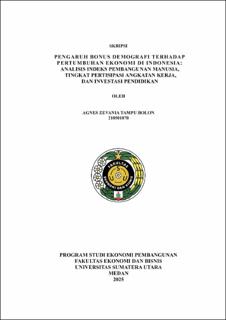Pengaruh Bonus Demografi terhadap Pertumbuhan Ekonomi di Indonesia: Analisis Indeks Pembangunan Manusia, Tingkat Partisipasi Angkatan Kerja, dan Investasi Pendidikan
The Effect of Demographic Bonus on Economic Growth in Indonesia: An Analysis of Human Development Index, Labour Force Participation Rate, and Education Investment

Date
2025Author
Tampubolon, Agnes Zevania
Advisor(s)
Andrasari, Monika
Metadata
Show full item recordAbstract
The demographic bonus provides a strategic opportunity for Indonesia to accelerate economic growth through the dominance of the productive age population. This period is expected to take place in Indonesia in 2020-2030, characterised by an increasing proportion of the working-age population that can be a major force in national economic development. This study aims to analyse the effect of demographic bonus on Indonesia's economic growth through three main indicators, namely the Human Development Index (HDI), Labour Force Participation Rate (TPAK), and Education Investment.
This study uses panel data of 34 provinces in Indonesia during the 2019-2023 period and is analysed using the Fixed Effect Model (FEM) method. The results showed that simultaneously the three variables had a significant effect on economic growth, indicated by an F-statistic value of 2697.022 with a probability of 0.000000 (p < 0.05). The Adjusted R² value of 0.998262 indicates that 99.82% of the variation in economic growth can be explained by HDI, TPAK, and Education Investment.
The results show that partially, HDI has a positive and significant effect on economic growth, while TPAK and Education Investment also show a positive direction of the relationship, although not yet statistically significant. These findings strengthen the argument that the demographic bonus can make a real contribution to economic growth if it is supported by the quality of education, high labour participation, and improved quality of life.
Collections
- Undergraduate Theses [2768]
